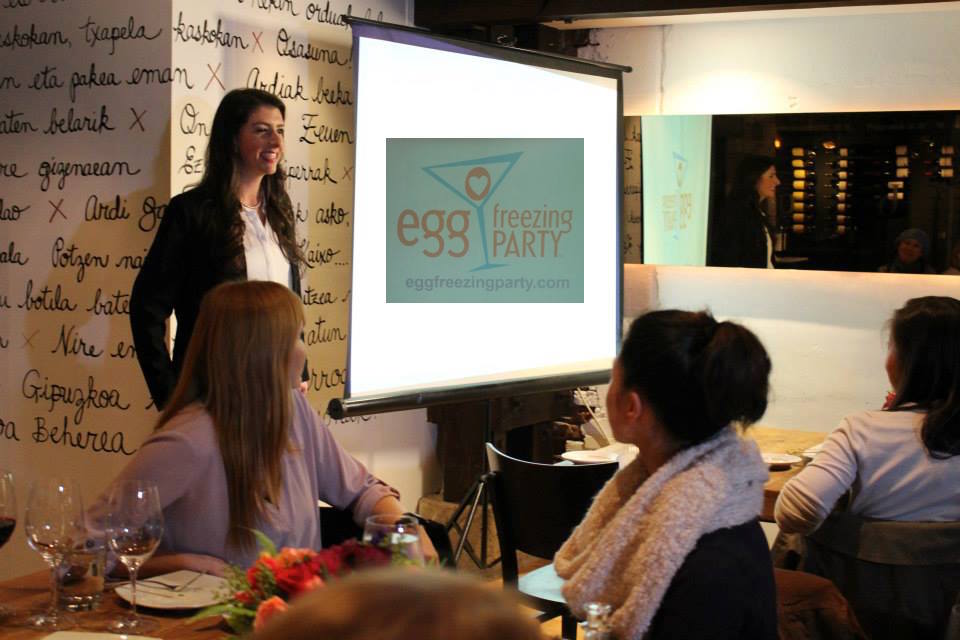
It started in 2014 when I heard that Facebook and Apple announced that they would offer egg freezing to their female employees — for free. I was captivated. What was egg freezing and why were these companies (which had more or less come to define so many aspects of my life) giving it away?
As I began my search for answers I was struck, not simply by this potentially revolutionary procedure, but by the myriad ways it was construed, criticized and made controversial in the media. As a young female student with a history of fertility issues and with aspirations for a high-flying career, I was determined to understand what this new technology could mean for me. At the time, I was studying Politics and Sociology at Cambridge and after submitting a research thesis to a British investment company, I was awarded an extremely generous grant to do just that.

Through intensive sociological and scientific reading, I entered the exciting, innovative realms of assisted reproductive technologies. I learned of the severity of infertility and the stigma which surrounded it. I explored the various treatments and technologies which were being developed to combat it. Perhaps most shockingly, I encountered a world of contradiction, prejudice, and judgment. The media seemed to depict egg freezing as an alien, invasive technology and those who pursued it as career bitches, desperate spinsters or ignorant women unaware of the small chances for success. From my perspective, however, egg freezing seemed to be a ray of hope for women whose lives had not panned out as they had dreamed. I wanted to understand how the treatment could transform their futures and why the popular press was so pitted against these possibilities.
I found myself in California, a hub of technology and the wild wild west of assisted reproduction. Instantly, I could see why I was invited to the Egg Freezing Parties. Doctors asked if I had considered donating my eggs and girls my age longed for egg freezing as a graduation gift. This openness provided fertile ground for me to conduct further sociological research. I sought to understand who was undertaking egg freezing, what their motivations were and the emotional journeys which followed or proceeded the treatment.
My experience was amazing. The egg freezing party was a highlight of my trip. The event was held in San Francisco by the wonderful Dr. Aimee Eyvazzadeh. She was glamorous, hard-working, highly intelligent and extremely honest. As I spoke to those around me around me, I realized her guests were a reflection of her. I was surprised by the diversity of the women I met there. Some were in their late thirties as I had expected, but there were mothers enquiring for their daughters, younger working couples unable to afford a baby, and girls younger still, simply curious about their fertility options.
I was most struck by a beautiful teenager who became a mother aged 16. Whilst she was very happy with her baby, she felt she had been too young and wanted to freeze her eggs so that she could be more financially and romantically settled before her next child. Her self-confidence and openness were so touching. I left the event feeling inspired by these women, but also frustrated. It seemed there was a real lack of understanding about how fast female fertility declines, much less about the options they have to counter this. I wanted more to experience events like this.
It is difficult to put into words how much I learned and how touched I was by the women who so generously gave their time to speak with me. It is more difficult perhaps to describe how far from the media caricatures of ‘social egg freezers’ these women were. Every ‘freezer’ was young, motivated and clearly highly intelligent, many with impressive careers. Some were single whilst some were in relationships. All were extremely informed about risks and success rates. None were unduly optimistic.
These women were realists, they saw that high-flying careers and modern costs of living were not always compatible with relationships, much less motherhood. They wanted to take control of their fertility, they wanted to level the biological playing field, and however fragile it might be, they wanted an insurance plan; a ray of hope for the future. I was inspired. I hope for a future where our decisions are made without judgment and where ongoing research allows for this technology becomes more successful, cheaper and accessible to all those who believe in its positive possibilities.
ABOUT GUEST CONTRIBUTOR
 My name is Abbie Gilbert. I’m a twenty-something millennial living in the United Kingdom. I’m a recent graduate of the University of Cambridge and am currently learning a new career in the vibrant city of Edinburgh. I’m discovering my passions and exploring life along the way. I find myself writing about journeys to keep things in perspective. As a young woman with big aspirations, thoughts of fertility are never far from my mind. I hope you enjoy my writing and I would love to hear your thoughts. Questions? Contact me via email: abbielouise.g@hotmail.co.uk or follow me on Twitter @abbieloo and Instagram @abbielouiseg.
My name is Abbie Gilbert. I’m a twenty-something millennial living in the United Kingdom. I’m a recent graduate of the University of Cambridge and am currently learning a new career in the vibrant city of Edinburgh. I’m discovering my passions and exploring life along the way. I find myself writing about journeys to keep things in perspective. As a young woman with big aspirations, thoughts of fertility are never far from my mind. I hope you enjoy my writing and I would love to hear your thoughts. Questions? Contact me via email: abbielouise.g@hotmail.co.uk or follow me on Twitter @abbieloo and Instagram @abbielouiseg.


